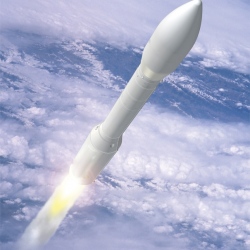
North Korea duly launched its satellite mission from the Sohae base on the Chinese border but soon had to admit the venture was a failure.
The nation’s own engineers will be trying to find out precisely what went wrong but so, also, will analysts from the international community, who will be keen to assess just how far Pyongyang has progressed in its efforts to master rocket technology.
The 30m(100ft)-long Unha-3 vehicle is said to have lifted off at 07:39 local time on Friday (22:39 GMT Thursday), and headed south out over the Yellow Sea.
The rocket’s trajectory, according to North Korea, was intended to take it and its Earth observation satellite payload towards a 500km-high polar orbit.
Within the hour, however, officials from Japan, South Korea and the US were briefing reporters that the mission had failed.
America in particular had a number of military systems in the region able to track the ascent.
The available information suggests the rocket disintegrated about 90 seconds into its flight, just before first-stage separation and ignition of the second stage.
One account talked of an unusually bright flaring coming from the vehicle.
All that fits with data indicating debris fell into the Yellow Sea about 165km (103 miles) west of Seoul, well short of the impact site where the North Koreans had planned to drop the first stage on a nominal flight.
Inviting disaster
We should not be surprised by the outcome.
To put this type of endeavour in some sort of context, a US company will launch a rocket in the next month on the first commercial cargo re-supply mission to the space station. That company, with all the expertise and substantial investment available to it, took four launches before getting a working system.
North Korea is isolated, both intellectually and in terms of the materials and components it can source, and it will find success even harder to come by.
It is evident also that the country still has some very simple, but harsh, lessons to learn.
Consider for example the desire of Pyongyang officials to have the Kwangmyongsong ("Bright Shining Star") 3 satellite in orbit to coincide with Sunday’s centenary of the birth of the nation’s founding leader, Kim Il-Sung.
Western space experts will always tell you that schedule never determines readiness. It is the other way around.
To rush preparation just to meet an attractive date is to invite disaster.
The international community is appalled that North Korea should even be trying.
Critics saw Friday’s launch as a thinly veiled ballistic missile test, something which is banned by UN resolutions.
Although the latest flight was a failure, UN Security Council members will be concerned that persistence on the part of Pyongyang will eventually see its engineers develop capable rocket systems.
If these are allied to the necessary guidance and re-entry technologies, and the country’s already apparent advances in nuclear weaponry, North Korea would be in a position to seriously threaten its neighbours.
